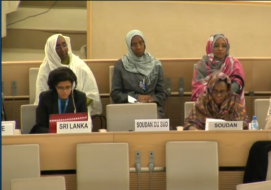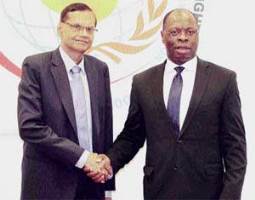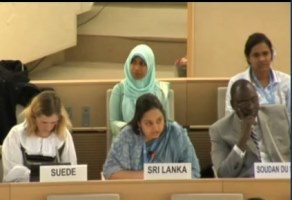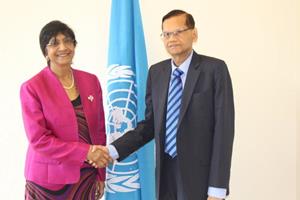

Minister of Plantation Industries and Special Envoy of the President on Human Rights, Hon. Mahinda Samarasinghe has said Sri Lanka’s opposition to the Resolution being moved by the US, UK and a few other countries against Sri Lanka was a fight on a matter of principle and that Sri Lanka would not compromise on it. Noting that what is happening to Sri Lanka today, could happen to any other NAM country tomorrow, Minister Samarasinghe called upon all Non-Aligned Movement (NAM) member states to continue to show solidarity with Sri Lanka.

Sri Lanka intervening during the 25th Session of the Human Rights Council under Agenda Item 3: Clustered ID with the Special Rapporteur on Freedom of Religion or Belief and the Special Rapporteur on Counter - Terrorism on 12th March 2014, said the recent sporadic attacks on religious targets are isolated incidents and there is an attempt to portray such sporadic incidents targeting places of worship as a sign of religious hatred and intolerance.

Sri Lanka intervening during the 25th Session of the Human Rights Council in an ID with the Special Rapporteur on Right to Food and Special Rapporteur on Right to Adequate Housing on 10thMarch 2014, has said 49,488 houses have been constructed in the Northern and Eastern Provinces for the IDPs under the North East Housing Reconstruction Programme (NEHRP).
Permanent Mission of Sri Lanka
Geneva
10 March 2014

External Affairs Minister and Leader of the Sri Lankan delegation to the UNHRC in Geneva, Prof. G.L. Peiris, called on Mr. Baudelaire Ndong Ella, the President of the United Nations Human Rights Council (UNHRC).
The discussion focused mainly on the procedures adopted by the Human Rights Council on Sri Lanka and the need to ensure a level playing field in the dealings between the UNHRC and Sri Lanka.
Permanent Mission of Sri Lanka
Geneva
09 March 2014

Sri Lanka's Permanent Representative to the UN in Geneva Ambassador Ravinatha Aryasinha, has said "the draft resolution on Sri Lanka deposited with the Human Rights Council by a core group comprising - the USA, UK, Mauritius, Montenegro and Macedonia, violates the constitutional provisions of Sri Lanka, is highly intrusive in nature and is in breach of the sovereignty of the Sri Lankan people and the territorial integrity of Sri Lanka". "In being politicised and in clear contravention of accepted principles of conduct in the Council", he said, "the resolution sets a bad precedent, and can in the medium-to-long term have an adverse impact on all developing countries in the Council".
Sri Lanka expresses reservations on attempts to politicise the situation of Sri Lanka in the Council

Sri Lanka has expresses its strong reservations on the misplaced reference in the Annual Report to the Secretary General’s Internal Review Panel (IRP) report on Sri Lanka including provision of link to the report in a footnote, in the context of prevention. We note however that the report relevant to the subject at hand is ‘the Rights Up Front’ plan of action, to which report, surprisingly, no such link is provided. The ‘Rights Up Front’ plan of action is not meant to be retroactive but forward looking. Regrettably, the misplaced attention paid to the IRP report, which is neither endorsed by the intergovernmental process nor based on credible sources and information, can only be construed as yet another attempt to politicise the situation of Sri Lanka in the Council.
Permanent Mission of Sri Lanka
Geneva
07.03.2014

External Affairs Minister Prof. G. L. Peiris has said, the highly prejudiced actions taken by a few countries and the Office of the High Commissioner for Human Rights (OHCHR) to give disproportionate negative attention to Sri Lanka, has made the separatist Tamil elements in Sri Lanka and abroad more intransigent, making the intensely difficult task of reconciliation in Sri Lanka, even harder. He said it was unfortunate that Sri Lanka has become a “political football” in the electoral fortunes in some countries.
- Minister Peiris rejects High Commissioner’s Report says those “those who exalt its virtues only seek to inflict harm on the reconciliation process”
- External Affairs Minister Peiris to address HRC High Level Segment on Wednesday
- Sri Lanka rejects High Commissioner Pillay's call "to establish an international inquiry mechanism"
